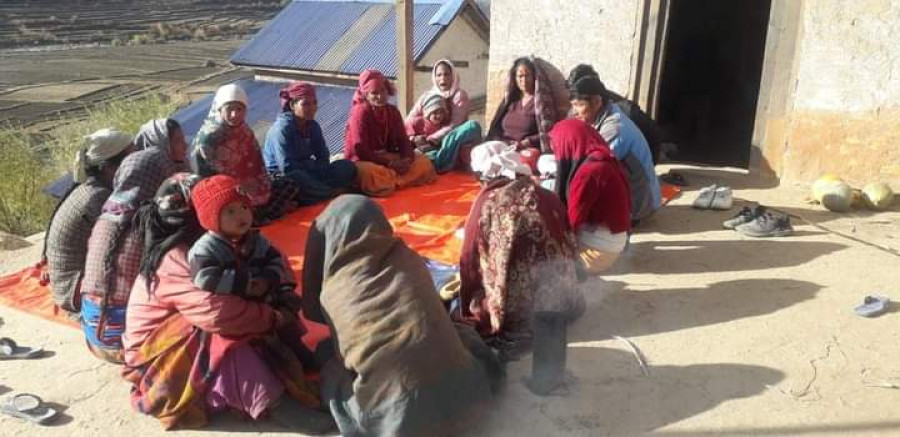Karnali Province
Local units in Jumla’s Sinja ramp up efforts to curb child marriage
Faced with a staggering prevalence of child marriages, three local units have teamed up to tackle the issue.
DB Budha
The local units in Sinja area of Jumla, a remote district in Karnali Province, have intensified their campaign against child marriage.
Three local units—Hima, Sinja and Kanakasundari rural municipalities—where child marriage is still prevalent—have conducted studies on the impacts the social problem has caused in the local communities.
The study, conducted in the first phase of the campaign, reflected a grim reality, says Purna Prasad Dhital, the chairman of Sinja Rural Municipality. Of the total 1,107 people who got married in Hima Rural Municipality in the past three years, 755 were underage. In Sinja Rural Municipality where 301 people got married during the same time period, 184 were underage.
Nepal abolished child marriage in 1963 but the practice is still rampant, especially in the countryside. According to the Civil Code 2017, the minimum age for marriage for both women and men in Nepal is 20.
In Kanakasundari Rural Municipality, 1,533 people got married in the last three years. Among them, 571 were underage.
Given the overwhelming number of child marriages still occurring in the areas, the three local units have decided to work harder to tackle the issue. Along with the people’s representatives, child clubs, network of woman rights activists, Dalit’s network, organisation of the disabled people and several other social organisations have been working to end child marriage practices as soon and as effectively as possible.
“Child marriage causes several other problems like bigamy or polygamy, domestic violence, malnutrition and other health complications among the newborns, rise of infant and maternal mortality, among others. We have been minutely studying the impacts of child marriage in society,” said Dhital. “We have upped our activities, in coordination with various international and national non-governmental organisations, to curb child marriage in the area.”
According to Dhital, Sinja Rural Municipality has been continuously working to control child marriage. “With the support of Plan International Nepal and CAD Nepal, Sinja has been publishing an annual study report on child marriage since 2020,” he said.
Child marriage is still a serious social problem in Jumla and other districts in Karnali Province despite the efforts of the government authorities and various organisations working against it.
Lack of awareness, education, mentorship and financial difficulties contribute to early marriages which in turn lead to domestic violence, health problems among young mothers and their children, and discord in married life, among others.
Stakeholders say that while earlier it was the parents who would propose their children marry young, but these days it is the children who elope and get married. Data collected by the three rural municipalities suggests that marriage among teenagers is on the rise.
Among all the wards of the three rural municipalities, ward 3 of Hima Rural Municipality is the only one which did not see a single child marriage in the past three years. According to Ratan Bahadur Shahi, the ward 3 chair, the absence of child marriage in the ward is the result of continuous awareness campaigns conducted in the villages by ward officials and the locals.
“We have been able to stop child marriage with the help of locals, security personnel, and other agencies working with the same motive. The ward office also gives gifts and support to the girls who get married after reaching the age of 20 in order to encourage other girls to not marry before they reach the marriageable age,” said Shahi.
In ward 2 of Sinja Rural Municipality, marriages can only take place at the recommendation of the ward office. The ward officials took this step to prevent children from eloping and getting married without the knowledge or consent of their parents.
“Awareness programmes conducted in different places of the ward have been found to be successful,” said Tirtha Oda, the chair of Sinja ward 2. “We have had to take some measures such as making recommendations from the ward office mandatory to get married to control child marriages,” said Oda.
According to Ajay Mahara, programme manager of Collaborative Action for Dignity Nepal, a non-governmental organisation working to stop child marriage, work is going on to bring children to school and to raise awareness among adolescents about sexual and reproductive health in the local units of Jumla.
“The work of establishing a strong foundation to stop child marriage is being done regularly. We organise open discussions with faith healers and elderly people to help us spread awareness about the ills of child marriage. We also conduct street functions, and organise debates in several schools on the topic,” said Mahara. “So far, our efforts have been found to be successful, and we will not stop until child marriage is completely eradicated from society.”




 15.12°C Kathmandu
15.12°C Kathmandu















